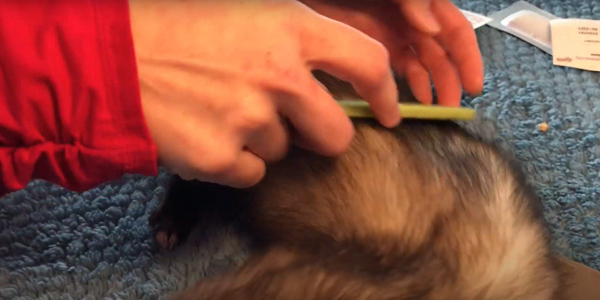Fleas are a burden on any pet parent. But once they’ve infested your furry friend, they can be a lot to deal with. Whilst the internet doesn’t lack bizarre flea cures, everything doesn’t work. Does it?
So, apple cider vinegar for fleas on ferrets, will this be effective?
Definitely! Apple Cider Vinegars are flea’s worst enemy. As it stinks it can’t stay longer on your ferrets. There’s a way to proportion your cider vinegar solution in equal parts with water. Beware of the application as it might also hurt. There are some alternatives too if you want to look at them.
It’s not difficult to make the solution and use it. Still, we’ve covered all of that in-depth in this article. Continue reading to learn more!
What Causes Fleas in Ferrets?

Infestation of fleas in pet animals is very common. It doesn’t necessarily mean that you are caring for your ferret poorly. But if well taken care of, can fleas live on ferrets?
Any animal can get fleas. And it has very little to do with the care you are providing for your pet.
Fleas are dormant insects that travel via animal exposure. It can also spread through you if you get in touch with an infected animal before.
Fleas grow best in warm, moist conditions. Ferrets could also draw fleas from hidden mite eggs in interiors for up to two years.
So, be careful while adding old and warm furnishings to your residence. You might face fleas’ ravage.
Once your ferret seems to have fleas, it may not be instantly obvious. And the trouble can escalate quickly until you understand care is needed. You can use apple cider vinegar for fleas in the house.
You may observe your animal scratching itself more frequently than usual, along with gnawing or licking itself. So you would immediately want to kill fleas on ferrets.
How Does Apple Cider Vinegar Help with Ferret Fleas?

When it comes to treating ferrets for fleas, apple cider vinegar always receives some attention.
So if your question is does apple cider vinegar treat fleas? Yes, you can use apple cider vinegar to repel fleas and treat your ferret.
Cider Vinegar is odor-free and non-toxic to the surrounding. It is organic and additives-free and safe for both animals and children. It also helps ease itchy bites on your ferret.
So you don’t have to quarantine your ferret away from children in your house if any. Thinking of getting rid of fleas on ferrets? You can use apple cider vinegar for fleas and ticks by following a few steps.
Step 1: Make a Spray Instead
You can’t just grab a bottle and rub it all over your pet! Because the pH level of cider vinegar is very high. That can’t be put directly on your fur pet’s skin.
So it will have a good effect on repelling fleas. And it should be used as a complement to other solutions. This should be great for treating fleas on ferrets.
The fleas hate the taste and smell of this type of vinegar. They quickly go elsewhere looking for another host. But it is necessary to quarantine if you feel it can be risky for your other pets.
Step 2: Be Careful with ACV
Mixing the cider vinegar with fluid is all that is required to make your flea spray. Some users prefer combining cider vinegar and water in equal parts.
Others advise combining one part vinegar and three parts water. Experiment with both recipes to see which one suits your ferret the best.
The more condensed formula (1:1) will be more effective at repelling fleas. If your ferret is sensitive to the overpowering stench. Then initiate with a less dense formula (1:3). After that, steadily increase the concentration if they’re used to it.
Step 3: Check Before You Spray
Well, your ferret or any other pet must not already like the spray very much. But to avoid more hatred towards it. You must ensure that your ferret does not have any cuts or bruises.
As much as acetic the spray is, it will sting if applied directly to a wound. Also, avoid spraying it in your ferret’s eyes.
You wouldn’t want your ferret to connect the flea bug spray with any unpleasantness. Rather you want them to embrace it.
Step 4: Apply with Caution
Before application, you should know that cider vinegar could be reactive. If you are using a used bottle for spraying then you better wash the bottle first.
In a clean spray bottle, combine the cider vinegar and water. Spray the solution directly to your ferret’s coat.
You can finish by massaging it using your fingertips. Ensure the diluted solution dries before washing it away.
A Few Effective Alternates
Of course, spraying is not the only way if your ferret hates getting sprayed on. There are some alternatives to cider vinegar application as well.
Try Mixing With Ferret’s Water
You can add a small amount of vinegar into your ferret’s water bowl. 3 tablespoons of apple cider vinegar per gallon of water will be more than enough.
Just a little bit will affect the taste of your ferret’s blood. Which will suddenly become very unpleasant to the fleas. Then they will stop sucking their blood. Ultimately die and fall off.
Give Bath to Your Ferret
If you’ve already had to deal with multiple fleas on your ferret. You’ll know how resilient these little bugs can be.
Whereas apple cider vinegar is an excellent repellent. If you have an invasion, you might have to take extra serious measures.
Dish detergent will kill the fleas and make sifting out larvae eggs a tad simpler.
Even so, it shouldn’t be your go-to procedure. Because the detergent may dry out your ferret’s body and cause inflammation.
But instead of a detergent, you can use shampoos for fleas. It’s 100% effective and also safe to use for your favorite ferret. Here is some option of shampoo that you can look into:
Hope this will make your ferret happy and be relieved from those useless fleas.
You can also try home remedies for fleas on ferrets. Coconut oil for fleas on ferrets can be of great use.
If you’ve managed to get rid of all the fleas. Then you can try a precautionary treatment like cider vinegar regularly.
FAQs
Do I have to be concerned about being bitten by fleas?
Yes. Fleas may attack people with severe infection, causing difficulties who are highly sensitive to pest bites. Claw marks can be seen, especially around the shins. Yet, anyone enduring skin problems, living in a flea-infested household can consult their doctor.
How do you put a halt to a ferret’s itchiness?
To ease pain and itchiness, an anti-inflammatory pill can also be given. Many times, ointment creams can be applied to the area to relieve skin irritation.
How frequently do ferrets require flea prevention?
Many veterinarians recommend a prescription for flea products for ferrets, which is the most prevalent. These products must be applied to ferrets once every month.
Parting Words
That was all! That’s all we had on your question if apple cider vinegar for fleas on ferrets effective?
I hope we were able to adequately respond. And clear up any issues you may have had. Also, look after your poor ferret!
Thank you for staying with us to the end.
Till next time!
- Can Ducks Eat Mushrooms? [Explained With Facts] - August 17, 2023
- Will Cayenne Pepper Keep Ducks Away? Answered in Detail - August 1, 2023
- Can Geese Eat Bananas? [Properly Answered] - June 27, 2023

